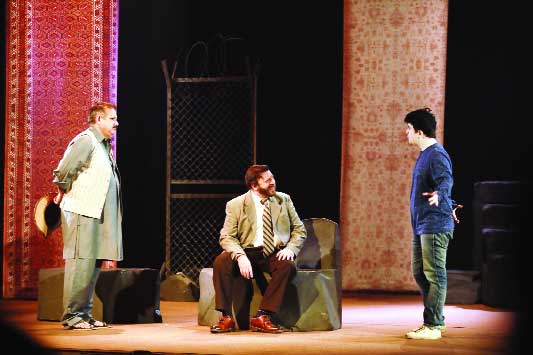The Kite Runner’s stage adaptation stays true to the flavour of the original, says Saimi Sattar
For bibliophiles, the choice is never a tough one, for they more often than not believe that adaptations of books as TV or web-series, a film or even a play will never match up to the original text. And when it comes to books that have left a strong impact, the assertion naturally becomes more vociferous. It was with this trepidation that I headed to watch The Kite Runner based on Khaled Hosseini’s first book, which was published in 2003 and spoke of friendship, betrayal and family ties set against the backdrop of the Russian invasion and the ravages that were wrought by the Taliban in Afghanistan. The large sweep of events, timelines, countries and languages certainly make it a challenging piece to be mounted on stage.
Directed by Akarsh Khurana, this production is based on Matthew Spangler’s adaptation. At the heart of the story, is the friendship and betrayal between two boys Amir, a Pashtun and Hassan, a Hazara. The former, while being a character in the play, also narrates the tale as seen from his eyes and perspective. He introduces the characters, talks about the important political and personal events as well as his own feelings in relation to the same. It skims over the political and prefers to focus on the personal.
The play does not have a lot of action, relying more on conversations to move the story forward. However, it is the dialogues that set the tone of the human interest story of the characters which are like any of us, with flaws and redeeming qualities. For instance when Baba says, that, “theft is the biggest sin”, you wonder why. But when he elaborates that, “When you lie, you steal a person’s right to truth. When you kill a man, you steal his wife’s right to a husband and children’s right to a father,” you find yourself nodding in agreement.
Then there is the background score, which while being foot-tapping transports you to Kabul. Moreover, while we sitting in a different country might think of Afghanistan as a monolith, the divisions between the Shia Hazaras and their treatment at the hands of the more dominant Sunni Pashtoons too is brought to the fore.
The first act is set in Kabul and keeps going back to a day which affected the life of Amir and Hassan. Amir’s father, whom he calls Baba, is a wealthy Pushtoon, while Hassan’s father, Ali is his servant and a low cast ‘Hazara’. Even though Amir and Hassan are inseparable and engage in wide variety of activities including kite-flying, reading books and troubling the neighbour’s dog together, the difference based not just on the financial status but that of the communities and sects that they come from make it difficult for Amir to acknowledge Hassan for what he is — a friend. Meanwhile, Ali and Baba have a deep bond as well, where the latter believes that he is almost like a brother.
In another track, Amir always gets the impression that his father feels that he is not worthy of being his son as he is not interested in ‘manly pursuits’ like soccer and prefers ‘writing’. While Baba never forgets Hassan’s birthday, which often irks Amir.
But there are rumblings in this ideal world where the neighbourhood bullies often trouble Amir and Hassan where the latter, given his skill with the slingshot, saves his master-friend each time.
During the kite flying competition, a traumatic incident, that casts a shadow on their remaining lives, takes place. Hassan pursues a falling kite where he is brutalised by the bullies, an incident which Amir witnesses but refuses to step in to prevent. This riddles Amir with guilt which is so deep that it affects everything around him — his relationships and what he becomes as a person.
In the second part of the play, Baba and Amir move to Pakistan after the 1979 invasion of Afghanistan by the Soviets during the course of which he saves a woman from being abducted by a soldier. They finally immigrate to America where Amir graduates in Creative Writing, gets married to Soraya while his father succumbs to cancer. He publishes his first book which he dedicates to Rahim Khan, his father’s friend who had encouraged him to write.
In the meantime, Rahim asks him to come down to Pakistan and tells him that Hassan was his half-brother which makes him realise that in some ways both he and his father had betrayed people who were ready to give up their lives for them. He tells Amir that, “there is a way to be good again” and alleviate his guilt. Finally Amir stands up and in his own way makes up for all the times that he did not do it for Hassan.
The performances were spot on. But not surprisingly, the veteran, Akash Khurana as Baba shone. What makes it interesting is that in this play, Abhishek Saha as Hassan and Nipun Dharmadhikari as Amir play both their young and adult versions. Another thing that needs a mention is the set which transformed from pre-Taliban Afghanistan to Pakistan to America and Taliban-ruled Afghanistan with ease.
Revisiting a book by way of a visual adaptation is never an easy task, but this one certainly eased the journey.
(The play was staged on October 5 and 6, brought by Aadyam Theatre, Akvarious Productions & D for Drama.)


























